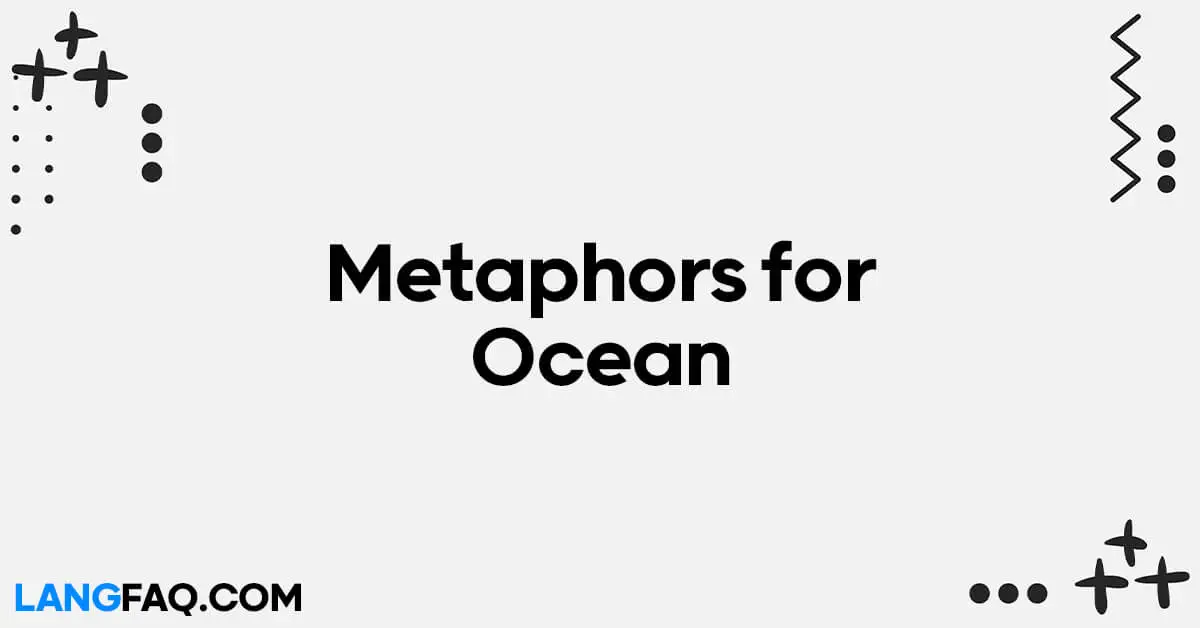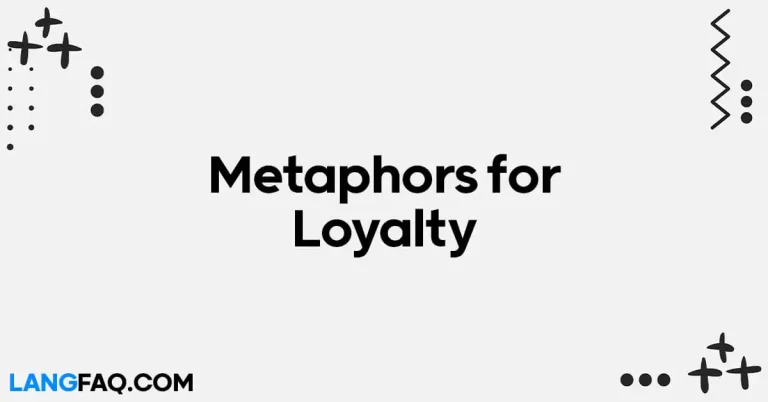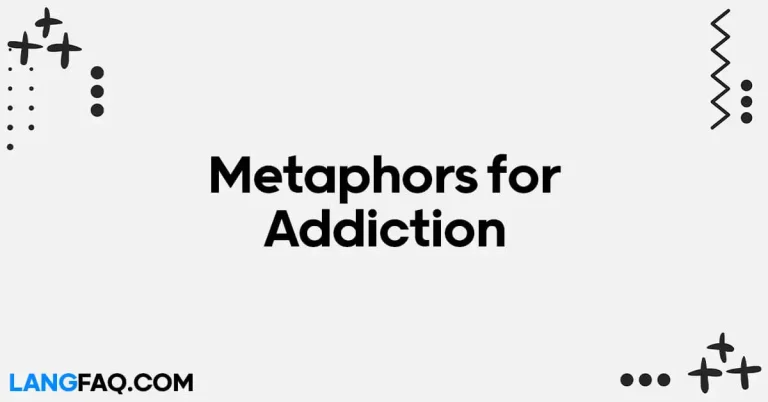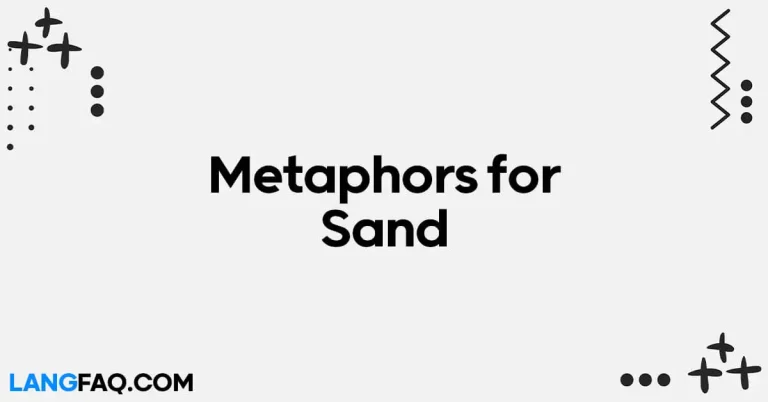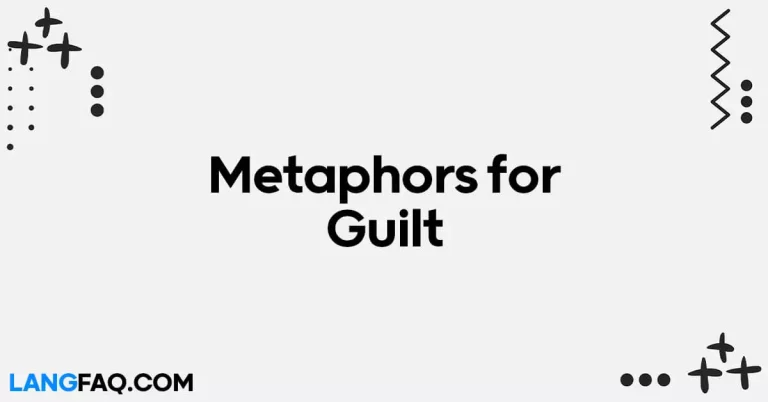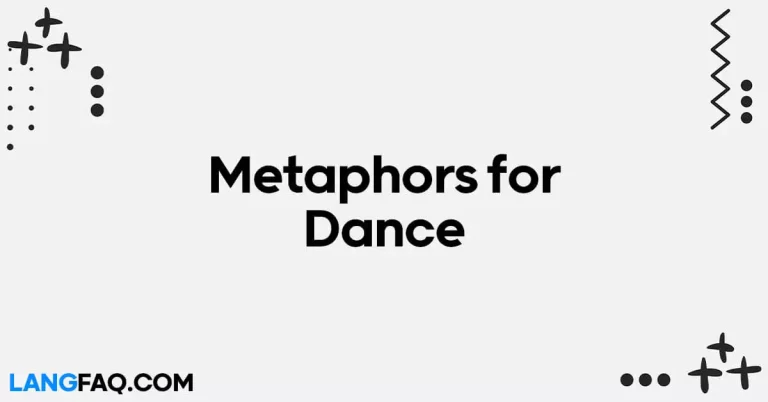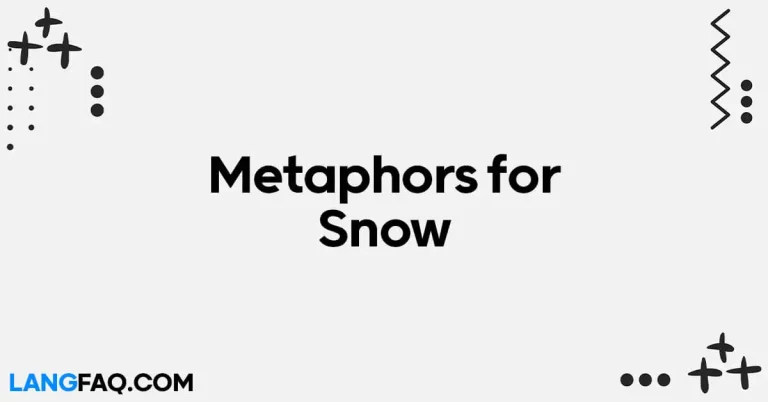The ocean, with its vastness and mystique, has been a perennial source of inspiration for poets, writers, and dreamers throughout history. It’s a canvas upon which the human imagination paints metaphors that evoke a wide range of emotions and sensations. In this article, we embark on a journey to explore 26 metaphors for the ocean, delving into the rich tapestry of imagery that this majestic body of water inspires.
26 Metaphors for the Ocean
- The Endless Abyss: The ocean’s depths are like an endless abyss, concealing mysteries that beckon explorers and adventurers.
- The Cradle of Life: Often called the cradle of life, the ocean teems with diverse ecosystems, nurturing countless species.
- The Roaring Beast: During a storm, the ocean can resemble a roaring beast, its waves fierce and untamed.
- The Mirror of the Sky: On calm days, the ocean becomes a mirror of the sky, reflecting the heavens above.
- The Whispering Muse: The ocean’s gentle lapping against the shore can be likened to a whispering muse, inspiring poets and writers.
- The Eternal Horizon: Gazing at the horizon where the ocean meets the sky, one can’t help but feel the sense of eternity.
- The Mother of Pearls: Pearls, formed within oysters in the ocean, are treasures born from the heart of the sea.
- The Blue Heart: With its deep blue hues, the ocean is often referred to as the Earth’s blue heart.
- The Liquid Desert: In the vastness of the open sea, the ocean can seem like a liquid desert, where survival is a constant struggle.
- The Music of Waves: Listening to the rhythmic crashing of waves, it’s easy to imagine the ocean as nature’s symphony.
- The Playground of Neptune: The ocean has long been associated with Neptune, the god of the sea, and is seen as his playground.
- The Silent Embrace: Beneath the surface, the ocean’s quiet embrace can be both serene and haunting.
- The Treasure Trove: Sunken ships and hidden treasures have made the ocean synonymous with adventure and discovery.
- The Medicine Cabinet: The ocean is a source of medicinal wonders, with marine life providing ingredients for numerous remedies.
- The Timeless Journey: Sailing across the open ocean feels like embarking on a timeless journey to the unknown.
- The Liquid Muse: Writers often turn to the ocean as a liquid muse, drawing inspiration from its ever-changing beauty.
- The Great Connector: The ocean connects continents, cultures, and people, serving as a symbol of unity.
- The Stormy Emotions: Metaphorically, the ocean’s storms can mirror the tumultuous emotions we experience.
- The Living Canvas: Coral reefs and marine life create a living canvas beneath the ocean’s surface.
- The Fountain of Youth: Legends abound of the ocean’s waters holding the secret to eternal youth.
- The Dance of Light: Sunlight dancing on the ocean’s surface is a mesmerizing spectacle.
- The World’s Lungs: The ocean plays a vital role in producing oxygen, earning it the title of the world’s lungs.
- The Timeless Storyteller: Waves crashing against the shore seem to whisper stories of the ages.
- The Deep Silence: In the ocean’s depths, a profound silence reigns, broken only by the occasional sound of marine life.
- The Eternal Mystery: The ocean’s vastness and uncharted depths remain an eternal mystery, waiting to be unraveled.
- The Heart’s Desire: For many, the ocean embodies the yearning of the heart for adventure and freedom.
These metaphors capture the diverse and captivating essence of the ocean, offering a glimpse into the poetic and imaginative ways we perceive this majestic body of water.
| Metaphor | Meaning | Example |
|---|---|---|
| The Endless Abyss | The ocean’s depths as a mysterious and endless expanse. | Explorers ventured into the endless abyss of the ocean. |
| The Cradle of Life | The ocean as the nurturing source of diverse life forms. | The coral reefs are the cradle of life in the ocean. |
| The Roaring Beast | The ocean during a storm as a fierce and untamed entity. | The roaring beast of the ocean unleashed its fury. |
| The Mirror of the Sky | The ocean’s calm surface mirroring the sky above. | The tranquil ocean acted as a mirror of the evening sky. |
| The Whispering Muse | The soothing sound of ocean waves inspiring creativity. | The poet found inspiration in the ocean’s whispering muse. |
| The Eternal Horizon | The horizon where the ocean meets the sky signifying eternity. | They watched the sunset on the eternal horizon. |
| The Mother of Pearls | Oysters in the ocean that produce treasures like pearls. | The ocean’s oysters are the mother of pearls. |
| The Blue Heart | The deep blue color of the ocean representing its significance. | The blue heart of the Earth is its vast oceans. |
| The Liquid Desert | The open sea as an unforgiving and harsh environment. | Surviving in the liquid desert of the ocean is challenging. |
| The Music of Waves | The rhythmic sound of waves resembling a natural symphony. | The beach offered the soothing music of waves. |
| The Playground of Neptune | The ocean as the domain of Neptune, god of the sea. | Sailors often felt they were in the playground of Neptune. |
| The Silent Embrace | The quiet and sometimes eerie embrace of the ocean. | They were mesmerized by the silent embrace of the sea. |
| The Treasure Trove | Sunken ships and hidden riches beneath the ocean’s surface. | Legends speak of the ocean as a treasure trove. |
| The Medicine Cabinet | Marine life in the ocean providing medicinal resources. | The ocean’s medicine cabinet holds many healing secrets. |
| The Timeless Journey | Sailing across the ocean feels like an ageless adventure. | Their voyage was a timeless journey on the open sea. |
| The Liquid Muse | The ocean inspiring writers with its ever-changing beauty. | The author found the ocean to be a liquid muse for poetry. |
| The Great Connector | The ocean symbolizing unity by connecting continents. | The ocean serves as a great connector of diverse cultures. |
| The Stormy Emotions | Ocean storms mirroring the tumultuousness of human emotions. | Her mood was like the stormy emotions of the ocean. |
| The Living Canvas | Coral reefs and marine life as a vibrant living canvas. | Snorkeling among the living canvas of the reef was amazing. |
| The Fountain of Youth | Belief that the ocean’s waters hold the secret to eternal youth. | Some cultures see the ocean as the fountain of youth. |
| The Dance of Light | Sunlight reflecting on the ocean’s surface in a mesmerizing way. | The evening sun created a beautiful dance of light on the ocean. |
| The World’s Lungs | The ocean’s role in producing oxygen and supporting life. | The ocean is often referred to as the world’s lungs. |
| The Timeless Storyteller | Waves whispering tales and stories of ages to those who listen. | The timeless storyteller, the ocean, shared its secrets. |
| The Deep Silence | The profound silence that prevails in the ocean’s depths. | Diving into the deep silence of the ocean was eerie. |
| The Eternal Mystery | The never-ending enigma of the ocean’s vastness and depths. | The ocean’s eternal mystery continues to intrigue. |
| The Heart’s Desire | The ocean representing the yearning for adventure and freedom. | His heart’s desire was to explore the vast ocean. |
These metaphors help us grasp the multifaceted nature of the ocean and its significance in human perception and culture.
The Endless Abyss: Unveiling the Ocean’s Mysteries
Meaning: The ocean’s depths are often described as an endless abyss, emphasizing their profound and mysterious nature.
Scenario: The phrase “endless abyss” can be effectively used in a formal context, such as a scientific paper discussing the exploration of oceanic trenches. It conveys the sense of the ocean as an enigmatic realm.
Example Sentence (Formal): “Researchers embarked on a daring expedition to the Mariana Trench, an area known for its endless abyss, in search of undiscovered species.”
Variations:
- Colleague to Colleague: “I read about a fascinating documentary on the endless abyss of the ocean. Let’s watch it together.”
- Mentor to Mentee: “Exploring the endless abyss of knowledge in marine biology will be a rewarding journey for you.”
Pros:
- Evokes a sense of wonder and curiosity.
- Creates a vivid mental image of the ocean’s depths.
Cons:
- May sound overly dramatic in casual conversations.
Grammar/Usage Tip: When using “endless abyss,” ensure it’s contextually appropriate, as it carries a weighty tone.
Exception: While “endless abyss” is suitable for formal and descriptive writing, it may not be the best choice for light-hearted discussions about the ocean.
Definition Insight: According to Cambridge Dictionary, “abyss” refers to a very deep or seemingly bottomless chasm, while “endless” implies something that has no end or limit.
The Cradle of Life: Nurturing Biodiversity in the Ocean
Meaning: The ocean is often referred to as the cradle of life, highlighting its role in nurturing diverse ecosystems and species.
Scenario: This metaphor is apt for formal presentations or discussions on marine conservation and biodiversity.
Example Sentence (Formal): “Preserving the health of our oceans is crucial, as they serve as the cradle of life for countless marine species.”
Variations:
- Friend to Friend: “Did you know the ocean is like the ultimate cradle of life? It’s incredible how much life it supports.”
- Mentor to Mentee: “Understanding the ocean’s role as the cradle of life is fundamental to marine biology.”
Pros:
- Emphasizes the ocean’s vital ecological importance.
- Invokes a sense of responsibility for ocean conservation.
Cons:
- May be overly formal for casual conversations.
Grammar/Usage Tip: When using “cradle of life,” ensure it’s relevant to the discussion’s context, such as marine biology or environmental science.
Exception: While appropriate for most formal contexts, consider the audience when using this metaphor in casual discussions.
Definition Insight: According to Cambridge Dictionary, a “cradle” is a place where something begins or is nurtured, and “life” refers to the existence of living things.
The Roaring Beast: Confronting the Fury of the Ocean
Meaning: This metaphor portrays the ocean during a storm as a fierce and untamed entity, highlighting its powerful and unpredictable nature.
Scenario: “Roaring beast” is suitable for both formal and informal contexts when describing extreme weather conditions at sea.
Example Sentence (Formal): “The maritime industry faces significant challenges when navigating through the roaring beast of the ocean during storms.”
Variations:
- Casual Conversation: “You won’t believe the footage of the ocean as a roaring beast during that hurricane. It was terrifying!”
- Mentor to Mentee: “Handling a ship in the face of the roaring beast requires skill and experience.”
Pros:
- Evokes a strong emotional response.
- Describes the ocean’s formidable force effectively.
Cons:
- May sound alarmist in some contexts.
Grammar/Usage Tip: Use “roaring beast” when discussing extreme weather conditions at sea, such as hurricanes or typhoons.
Exception: While it effectively conveys the ocean’s fury, avoid using this metaphor in overly casual or lighthearted conversations.
Definition Insight: “Roaring” refers to a loud and prolonged sound, while a “beast” signifies a powerful and often threatening creature.
The Mirror of the Sky: A Reflective Ocean
Meaning: This metaphor paints a picture of the ocean’s calm surface mirroring the sky above, emphasizing its tranquil and reflective qualities.
Scenario: “Mirror of the sky” is versatile and can be used in both formal and informal contexts, particularly in descriptions of serene oceanic scenes.
Example Sentence (Formal): “The research vessel sailed across the mirror of the sky, capturing pristine water samples for analysis.”
Variations:
- Friend to Friend: “Have you seen the ocean lately? It’s like a mirror of the sky, so peaceful and beautiful.”
- Mentor to Mentee: “Observing the ocean as the mirror of the sky can inspire a sense of tranquility.”
Pros:
- Elicits a sense of calm and beauty.
- Describes the ocean’s serene moments effectively.
Cons:
- May not be suitable when discussing the ocean’s more dynamic aspects.
Grammar/Usage Tip: Use “mirror of the sky” when emphasizing the ocean’s reflective qualities, such as on calm and clear days.
Exception: While versatile, consider the context to ensure it aligns with the tone of the conversation.
Definition Insight: A “mirror” reflects an image, and “sky” refers to the expanse of air over the Earth.
The Whispering Muse: Inspiring Creativity by the Shore
Meaning: The gentle lapping of ocean waves against the shore is likened to a whispering muse, suggesting that the ocean inspires artistic and creative endeavors.
Scenario: This metaphor is best suited for informal conversations or discussions about artistic inspiration.
Example Sentence (Casual): “I always bring my sketchbook to the beach; there’s something about the ocean’s whispering muse that sparks my creativity.”
Variations:
- Colleague to Colleague: “The ocean’s whispering muse works wonders for my writing. I’m more productive at the beach.”
- Mentor to Mentee: “Exploring the ocean’s influence as a whispering muse in literature can be an interesting research project.”
Pros:
- Evokes a sense of artistic inspiration.
- Reflects the soothing nature of the ocean’s sound.
Cons:
- May not be suitable for formal or technical discussions.
Grammar/Usage Tip: Use “whispering muse” in casual conversations where the focus is on creativity and inspiration.
Exception: Avoid using this metaphor in formal contexts, as it may not align with the professional tone.
Definition Insight: A “muse” is a source of artistic inspiration, and “whispering” implies a soft and gentle sound.
The Eternal Horizon: Where Earth Meets Sky
Meaning: This metaphor emphasizes the timeless beauty and boundless possibilities symbolized by the horizon where the ocean meets the sky.
Scenario: “Eternal horizon” is ideal for informal discussions on the philosophical or emotional aspects of the ocean’s vista.
Example Sentence (Casual): “Sitting by the beach and gazing at the eternal horizon, I felt a sense of limitless potential.”
Variations:
- Friend to Friend: “Let’s take a road trip to the coast and watch the sunrise at the eternal horizon.”
- Mentor to Mentee: “Contemplating the eternal horizon can be a profound exercise in mindfulness.”
Pros:
- Evokes a sense of wonder and introspection.
- Encourages reflection on life’s possibilities.
Cons:
- May not be suitable for scientific or technical discussions.
Grammar/Usage Tip: Use “eternal horizon” when delving into the philosophical or emotional aspects of oceanic views.
Exception: Avoid using this metaphor in contexts requiring precise scientific language.
Definition Insight: “Eternal” signifies something that is timeless and everlasting, while a “horizon” represents the apparent line where the Earth and sky meet.
The Mother of Pearls: Nature’s Treasure Trove
Meaning: Describing the ocean as the “mother of pearls” draws attention to its role in producing these valuable gems and highlights its capacity for hidden treasures.
Scenario: This metaphor is suitable for both formal and informal discussions involving gemology, jewelry, or marine biology.
Example Sentence (Formal): “The ocean, often referred to as the mother of pearls, continues to yield exquisite pearls prized in the jewelry industry.”
Variations:
- Colleague to Colleague: “I’m attending a lecture on the mother of pearls and their cultural significance. Interested?”
- Mentor to Mentee: “Exploring the ocean’s contribution as the mother of pearls is an intriguing research topic.”
Pros:
- Highlights the ocean’s economic and cultural significance.
- Provides a vivid image of pearl production.
Cons:
- May not be relevant in casual conversations unrelated to pearls or jewelry.
Grammar/Usage Tip: Use “mother of pearls” when discussing pearls, jewelry, or the cultural significance of these gems.
Exception: Exercise caution when using this metaphor in contexts where pearls are not the central topic.
Definition Insight: “Mother” symbolizes the source or origin of something, while “pearls” represent the valuable gemstones produced by certain mollusks.
The Blue Heart: Earth’s Pristine Essence
Meaning: Describing the ocean as the “blue heart” of the Earth highlights its fundamental role in maintaining the planet’s health and balance.
Scenario: This metaphor is suitable for formal discussions on environmental science, climate change, or oceanography.
Example Sentence (Formal): “The conservation of our blue heart, the ocean, is imperative for mitigating the effects of climate change.”
Variations:
- Friend to Friend: “We should all take part in protecting the Earth’s blue heart—the ocean. It’s crucial for our future.”
- Mentor to Mentee: “Understanding the blue heart of the Earth is essential for anyone studying environmental science.”
Pros:
- Emphasizes the ocean’s vital role in climate regulation.
- Encourages awareness of environmental issues.
Cons:
- May not be suitable for casual conversations unrelated to environmental topics.
Grammar/Usage Tip: Use “blue heart” when discussing the ocean’s role in climate regulation, environmental conservation, or related scientific subjects.
Exception: Avoid using this metaphor in casual conversations where the focus is not on environmental matters.
Definition Insight: “Blue” symbolizes the color of the ocean, and “heart” represents a vital and essential element.
The Liquid Desert: A Harsh and Unforgiving Expanse
Meaning: This metaphor characterizes the open sea as a challenging and often unforgiving environment, similar to a desert.
Scenario: “Liquid desert” is effective in formal and informal contexts when discussing extreme conditions at sea, survival skills, or adventure.
Example Sentence (Casual): “Sailing through the liquid desert of the ocean, we faced relentless storms and treacherous waves.”
Variations:
- Colleague to Colleague: “I watched a documentary about adventurers crossing the liquid desert on a small boat. It’s incredible!”
- Mentor to Mentee: “Navigating the liquid desert requires knowledge of seamanship and survival skills.”
Pros:
- Conjures a vivid mental image of challenging conditions.
- Highlights the courage and determination of those who face such challenges.
Cons:
- May sound overly dramatic in some contexts.
Grammar/Usage Tip: Use “liquid desert” when discussing extreme conditions at sea or the challenges faced by sailors and adventurers.
Exception: Exercise discretion in casual conversations, as this metaphor can be intense and may not suit all audiences.
Definition Insight: “Liquid” refers to the fluid nature of the ocean, while a “desert” signifies a barren and inhospitable landscape.
The Music of Waves: Nature’s Symphony by the Shore
Meaning: This metaphor likens the rhythmic sound of ocean waves to a harmonious symphony, emphasizing the soothing and melodic qualities of the ocean.
Scenario: “Music of waves” is versatile and can be used in both formal and informal contexts to describe the auditory experience of the ocean.
Example Sentence (Casual): “Lying on the beach and listening to the music of waves is my favorite way to relax.”
Variations:
- Friend to Friend: “We should plan a beach trip soon. I miss the music of waves and the feeling of sand between my toes.”
- Mentor to Mentee: “Exploring the ocean’s role as the music of waves in literature can be a fascinating project.”
Pros:
- Evokes a sense of tranquility and relaxation.
- Describes the sensory experience of the ocean effectively.
Cons:
- May not be suitable when discussing the ocean’s more turbulent aspects.
Grammar/Usage Tip: Use “music of waves” when focusing on the calming and melodic sounds of the ocean.
Exception: Be mindful of the context; this metaphor may not be appropriate in discussions about storms or dangerous sea conditions.
Definition Insight: “Music” refers to organized sound that is pleasing to the ear, while “waves” represent the rhythmic motion of the ocean’s waters.
The Playground of Neptune: Where Myths and Realities Merge
Meaning: Referring to the ocean as the “playground of Neptune” invokes the realm of mythology, connecting it to the god of the sea and alluding to the ocean’s vastness and power.
Scenario: This metaphor can be employed in both formal and informal settings, particularly when discussing maritime traditions, legends, or history.
Example Sentence (Formal): “Throughout history, sailors have navigated the challenging waters of the Atlantic, once believed to be the playground of Neptune.”
Variations:
- Friend to Friend: “Did you know that some sailors still believe in Neptune’s protection when they set out to sea? It’s a fascinating tradition.”
- Mentor to Mentee: “Exploring the ocean’s role as the playground of Neptune can provide valuable insights into maritime folklore.”
Pros:
- Connects the ocean to rich mythological traditions.
- Adds an element of mystique and wonder.
Cons:
- May require contextual explanation in some discussions.
Grammar/Usage Tip: Use “playground of Neptune” when delving into maritime myths, legends, and traditions.
Exception: Exercise care when using this metaphor in contexts where mythological references may not be relevant.
Definition Insight: “Playground” implies a space for play and recreation, and “Neptune” is the Roman god of the sea, analogous to the Greek god Poseidon.
The Silent Embrace: Submerged in Profound Serenity
Meaning: Describing the ocean’s depths as a “silent embrace” conveys the quiet and sometimes eerie embrace of the ocean, both calming and haunting.
Scenario: This metaphor is versatile, suitable for formal discussions on marine biology, oceanography, or in casual conversations about ocean experiences.
Example Sentence (Casual): “Diving into the ocean’s silent embrace, I was surrounded by a world of tranquility and mystery.”
Variations:
- Colleague to Colleague: “I recently tried scuba diving, and the sensation of being in the silent embrace of the ocean was surreal.”
- Mentor to Mentee: “Understanding the silent embrace of the ocean is crucial for marine biologists studying deep-sea ecosystems.”
Pros:
- Evokes a sense of serene isolation and wonder.
- Captures the essence of the ocean’s depths.
Cons:
- May not suit discussions requiring more scientific precision.
Grammar/Usage Tip: Use “silent embrace” when describing the ocean’s quiet depths and the sense of immersion in its world.
Exception: While versatile, consider the context and audience to ensure it aligns with the tone of the conversation.
Definition Insight: “Silent” implies the absence of sound, and an “embrace” suggests a close and enveloping hold.
The Treasure Trove: Secrets of the Ocean’s Depths
Meaning: Describing the ocean as a “treasure trove” alludes to the abundance of sunken ships, hidden riches, and undiscovered wonders beneath its surface.
Scenario: This metaphor is well-suited for informal discussions about maritime history, archaeology, or adventure stories involving the ocean.
Example Sentence (Casual): “Exploring the ocean’s treasure trove of shipwrecks has been a lifelong passion of mine.”
Variations:
- Friend to Friend: “Have you heard about the latest discovery in the ocean’s treasure trove? It’s a gold mine of history!”
- Mentor to Mentee: “Researching the ocean’s role as a treasure trove of historical artifacts can be a captivating project.”
Pros:
- Sparks curiosity about maritime history and exploration.
- Conjures images of hidden riches and historical mysteries.
Cons:
- May not be suitable for formal or technical discussions.
Grammar/Usage Tip: Use “treasure trove” when discussing shipwrecks, underwater archaeology, or historical aspects of the ocean.
Exception: Be mindful of the context; this metaphor may not be relevant in conversations unrelated to maritime history.
Definition Insight: A “treasure trove” is a repository of valuable items or wealth, often hidden or discovered over time.
The Medicine Cabinet: Nature’s Healing Bounty
Meaning: Describing the ocean as a “medicine cabinet” underscores its role as a source of medicinal wonders, with marine life providing ingredients for remedies.
Scenario: This metaphor is versatile, suitable for discussions on marine biology, pharmaceutical research, or casual conversations about the ocean’s benefits.
Example Sentence (Casual): “Taking a walk along the shore, I marveled at the ocean’s vast medicine cabinet, where countless remedies are waiting to be discovered.”
Variations:
- Colleague to Colleague: “The ocean’s medicine cabinet has provided breakthroughs in healthcare. It’s incredible how nature holds the answers.”
- Mentor to Mentee: “Exploring the ocean’s role as a medicine cabinet of potential cures is a promising field of research.”
Pros:
- Highlights the ocean’s potential contributions to healthcare.
- Encourages appreciation for marine biodiversity.
Cons:
- May not be suitable for formal contexts unrelated to marine biology or pharmaceuticals.
Grammar/Usage Tip: Use “medicine cabinet” when discussing the ocean’s role in providing natural remedies and potential medical breakthroughs.
Exception: While versatile, consider the context and audience to ensure it aligns with the tone of the conversation.
Definition Insight: A “medicine cabinet” refers to a storage space for medical supplies and remedies, and “medicine” denotes substances used to treat or prevent diseases.
The Timeless Journey: Navigating the Seas of Adventure
Meaning: Describing the act of sailing across the ocean as a “timeless journey” evokes a sense of enduring exploration and adventure.
Scenario: This metaphor can be employed in both formal and informal settings when discussing maritime expeditions, travel, or personal experiences.
Example Sentence (Casual): “Embarking on a timeless journey across the ocean, we discovered new cultures, faced challenges, and forged lifelong memories.”
Variations:
- Friend to Friend: “Let’s plan our own timeless journey—a sailing trip to explore new horizons and create unforgettable moments.”
- Mentor to Mentee: “Navigating a timeless journey on the open sea requires seamanship skills and a spirit of adventure.”
Pros:
- Evokes a sense of exploration, excitement, and personal growth.
- Encourages a love for adventure and travel.
Cons:
- May not be suitable for formal contexts unrelated to travel or maritime activities.
Grammar/Usage Tip: Use “timeless journey” when describing the act of sailing or embarking on an adventurous voyage.
Exception: Be mindful of the context; this metaphor may not be appropriate in conversations unrelated to travel or exploration.
Definition Insight: “Timeless” implies enduring and not affected by time, and a “journey” represents a travel or expedition, often with a sense of discovery.
The Liquid Muse: Inspiring Creative Expression
Meaning: The ocean, as the “liquid muse,” is seen as a constant source of inspiration for artists, writers, and creators due to its ever-changing beauty.
Scenario: This metaphor is ideal for both formal and informal discussions about the arts, literature, and the creative process.
Example Sentence (Formal): “Throughout history, poets and painters have drawn from the depths of the ocean, considering it a timeless liquid muse.”
Variations:
- Friend to Friend: “Whenever I feel stuck creatively, I take a walk by the ocean. It’s like the liquid muse always has something to say.”
- Mentor to Mentee: “Exploring the ocean as a liquid muse in literature and art can be a captivating research endeavor.”
Pros:
- Evokes a sense of artistic inspiration.
- Encourages appreciation for the ocean’s aesthetic qualities.
Cons:
- May not be suitable for technical or scientific discussions.
Grammar/Usage Tip: Use “liquid muse” when discussing the ocean’s role in inspiring artistic or creative endeavors.
Exception: Be mindful of the context; this metaphor may not be relevant in conversations unrelated to the arts.
Definition Insight: A “muse” is a source of inspiration for creative endeavors, and “liquid” refers to the fluid nature of the ocean.
The Great Connector: Bridging Cultures and Continents
Meaning: The ocean is described as the “great connector” because it symbolizes unity by connecting different continents and cultures through trade, travel, and communication.
Scenario: This metaphor is suitable for formal discussions on globalization, history, international relations, or cultural diversity.
Example Sentence (Formal): “Throughout history, the ocean has served as the great connector, facilitating the exchange of goods, ideas, and cultures between nations.”
Variations:
- Colleague to Colleague: “The ocean’s role as the great connector in human history is a testament to the power of trade and communication.”
- Mentor to Mentee: “Understanding the great connector aspect of the ocean is vital for those studying global affairs.”
Pros:
- Highlights the ocean’s crucial role in human history and global interactions.
- Encourages appreciation for cultural diversity and interconnectedness.
Cons:
- May not be suitable for casual conversations unrelated to history or globalization.
Grammar/Usage Tip: Use “great connector” when emphasizing the ocean’s role in bridging cultures and continents.
Exception: Exercise discretion when using this metaphor in contexts where historical or cultural references may not be relevant.
Definition Insight: A “connector” is something that links or joins different parts or entities, and “great” signifies its significant magnitude or importance.
The Stormy Emotions: Mirroring Human Feelings
Meaning: Ocean storms are likened to human emotions, highlighting how the tumultuousness of the sea can mirror the complex and intense nature of human feelings.
Scenario: This metaphor is versatile, suitable for both formal and informal discussions involving emotions, psychology, or personal experiences.
Example Sentence (Casual): “As the stormy emotions of the ocean raged on, I couldn’t help but feel a deep connection to its power and intensity.”
Variations:
- Friend to Friend: “Have you ever noticed how the ocean’s mood can match your own emotions? It’s almost like nature understands us.”
- Mentor to Mentee: “Exploring the connection between the stormy emotions of the ocean and human psychology is a fascinating area of study.”
Pros:
- Creates a relatable and emotional connection to the ocean.
- Encourages reflection on the intersection of nature and human experience.
Cons:
- May not be suitable for formal contexts unrelated to emotions or psychology.
Grammar/Usage Tip: Use “stormy emotions” when discussing the ocean’s connection to human feelings and emotions.
Exception: Be mindful of the context; this metaphor may not be relevant in conversations unrelated to emotions or personal experiences.
Definition Insight: “Stormy” refers to turbulent and tempestuous conditions, while “emotions” represent complex human feelings and moods.
The Living Canvas: A World of Vibrant Beauty
Meaning: Coral reefs and marine life are depicted as a “living canvas,” highlighting their colorful and vibrant nature, much like an artist’s canvas.
Scenario: This metaphor is suitable for discussions on marine biodiversity, conservation, or personal experiences like snorkeling and scuba diving.
Example Sentence (Casual): “Exploring the living canvas of the coral reef felt like entering a world of vibrant beauty and endless wonder.”
Variations:
- Colleague to Colleague: “Have you ever witnessed the living canvas of a coral reef up close? It’s like swimming in a painting.”
- Mentor to Mentee: “Understanding the significance of preserving the living canvas of marine ecosystems is a crucial aspect of marine biology.”
Pros:
- Elicits a sense of awe and appreciation for marine life.
- Describes the vivid and captivating qualities of coral reefs.
Cons:
- May not be suitable for formal contexts unrelated to marine biology or conservation.
Grammar/Usage Tip: Use “living canvas” when emphasizing the colorful and vibrant nature of coral reefs and marine ecosystems.
Exception: Be mindful of the context; this metaphor may not be appropriate in conversations unrelated to marine life or conservation.
Definition Insight: A “canvas” is a surface for painting, and “living” signifies something full of life and vitality.
The Fountain of Youth: A Quest for Eternal Vitality
Meaning: The ocean’s waters are associated with the “fountain of youth,” a mythical source of eternal youth and vitality, emphasizing its rejuvenating potential.
Scenario: This metaphor is versatile, suitable for discussions on health, wellness, mythology, or personal anecdotes about the ocean’s perceived benefits.
Example Sentence (Casual): “Spending time by the ocean has always made me feel refreshed, as if I’ve discovered my own personal fountain of youth.”
Variations:
- Friend to Friend: “There’s something about the ocean that feels like a fountain of youth. I always leave with renewed energy.”
- Mentor to Mentee: “Exploring the concept of the ocean as a fountain of youth in literature and folklore is a captivating research project.”
Pros:
- Evokes a sense of rejuvenation and well-being.
- Encourages appreciation for the ocean’s perceived healing qualities.
Cons:
- May not be suitable for formal contexts unrelated to health or mythology.
Grammar/Usage Tip: Use “fountain of youth” when discussing the ocean’s role in rejuvenation and vitality.
Exception: Be mindful of the context; this metaphor may not be relevant in conversations unrelated to health or well-being.
Definition Insight: The “fountain of youth” is a legendary spring that grants eternal youth to those who drink from it, often found in folklore and mythology.
The Salty Tears of the Earth: Nature’s Emotional Reservoir
Meaning: Describing the ocean as “the salty tears of the Earth” emphasizes its vastness and its role in storing water, reflecting the idea of Earth’s emotional reservoir.
Scenario: This metaphor can be used in both formal and informal discussions related to environmental science, climate change, or emotional connections to nature.
Example Sentence (Formal): “Understanding the ocean as the salty tears of the Earth is crucial for comprehending its influence on global weather patterns.”
Variations:
- Friend to Friend: “Sometimes, when I look at the ocean, it feels like the Earth’s way of shedding tears. Do you ever feel that connection?”
- Mentor to Mentee: “Exploring the emotional resonance of the ocean as the salty tears of the Earth can be a thought-provoking research project.”
Pros:
- Evokes a sense of interconnectedness between nature and emotions.
- Encourages reflection on the environmental significance of the ocean.
Cons:
- May not be suitable for conversations unrelated to environmental or emotional themes.
Grammar/Usage Tip: Use “salty tears of the Earth” when discussing the ocean’s connection to Earth’s water cycle and its emotional symbolism.
Exception: Be mindful of the context; this metaphor may not be appropriate in conversations unrelated to environmental science or emotional themes.
Definition Insight: “Salty” refers to the salt content in seawater, “tears” symbolize a form of emotional expression, and “Earth” represents our planet.
The Ocean’s Breath: A Lifeline of Oxygen
Meaning: Describing the ocean as “the ocean’s breath” draws attention to its role as a primary source of oxygen production through marine plants, particularly phytoplankton.
Scenario: This metaphor is suitable for formal discussions on marine biology, ecology, environmental science, or even in casual conversations about ocean health.
Example Sentence (Formal): “Recognizing the ocean’s breath as a vital contributor to global oxygen production underscores the need for marine conservation efforts.”
Variations:
- Colleague to Colleague: “Have you ever considered the ocean’s breath as a source of our oxygen? It’s a fascinating ecological marvel.”
- Mentor to Mentee: “Studying the ocean’s role as the ocean’s breath in marine biology provides insights into ecosystem dynamics.”
Pros:
- Highlights the ocean’s critical role in sustaining life on Earth.
- Encourages awareness of marine conservation and ecological balance.
Cons:
- May not be suitable for casual conversations unrelated to marine biology or environmental topics.
Grammar/Usage Tip: Use “ocean’s breath” when discussing the ocean’s contribution to oxygen production and its ecological significance.
Exception: While versatile, consider the context and audience to ensure it aligns with the tone of the conversation.
Definition Insight: “Breath” symbolizes the act of inhaling and exhaling, and in this context, it signifies the ocean’s role in oxygen production.
The Endless Library: Stories Carved in the Sands
Meaning: Referring to the ocean as “the endless library” suggests that it holds countless stories, secrets, and knowledge, like words etched in the sands of time.
Scenario: This metaphor is ideal for both formal and informal discussions on history, archaeology, exploration, or personal experiences by the shore.
Example Sentence (Casual): “Walking along the beach, I often feel like I’m in the endless library of the ocean, where stories from ages past are waiting to be discovered.”
Variations:
- Friend to Friend: “Have you ever considered the beach as an endless library of tales from the past? It’s a fascinating perspective.”
- Mentor to Mentee: “Exploring the ocean’s role as the endless library of history can offer insights into maritime archaeology.”
Pros:
- Evokes a sense of curiosity and wonder about history.
- Encourages a deeper connection to coastal environments.
Cons:
- May not be suitable for formal contexts unrelated to history or coastal regions.
Grammar/Usage Tip: Use “endless library” when discussing the ocean’s connection to history, stories, and the passage of time.
Exception: Be mindful of the context; this metaphor may not be appropriate in conversations unrelated to history or coastal themes.
Definition Insight: An “endless library” is a figurative concept suggesting a repository of stories, knowledge, and information without end.
The Earth’s Lighthouse: Guiding Light in the Darkness
Meaning: The ocean is portrayed as “Earth’s lighthouse,” emphasizing its role in navigation, safety, and providing direction to travelers in the vast darkness of the sea.
Scenario: This metaphor is versatile, suitable for formal discussions on maritime navigation, safety, or in casual conversations about the ocean’s significance.
Example Sentence (Casual): “Sailing under the stars, I couldn’t help but feel grateful for the ocean, our Earth’s lighthouse, guiding us through the night.”
Variations:
- Colleague to Colleague: “The ocean as Earth’s lighthouse is a poetic way to think about its importance in maritime history and safety.”
- Mentor to Mentee: “Understanding the symbolism of the ocean as Earth’s lighthouse in literature can be an intriguing study.”
Pros:
- Evokes a sense of safety, guidance, and direction.
- Highlights the ocean’s historical and practical significance.
Cons:
- May not be suitable for casual conversations unrelated to navigation or safety.
Grammar/Usage Tip: Use “Earth’s lighthouse” when discussing the ocean’s role in navigation, safety, and its symbolic significance.
Exception: While versatile, consider the context and audience to ensure it aligns with the tone of the conversation.
Definition Insight: “Lighthouse” signifies a tower with a bright light at the top used to guide ships and provide navigation assistance.
The Ocean’s Symphony: Harmonious Waters
Meaning: The ocean is depicted as “the ocean’s symphony,” highlighting its melodious and harmonious nature, akin to a grand musical composition.
Scenario: This metaphor can be employed in both formal and informal discussions related to ocean sounds, marine life, or personal experiences by the sea.
Example Sentence (Casual): “Lying on the shore, I closed my eyes and let the ocean’s symphony of waves and wildlife lull me into a state of bliss.”
Variations:
- Friend to Friend: “Have you ever considered the ocean as a natural symphony? It’s like a peaceful concert that never ends.”
- Mentor to Mentee: “Exploring the ocean’s role as the ocean’s symphony in soundscapes can be an intriguing research project.”
Pros:
- Evokes a sense of calm, beauty, and appreciation for ocean sounds.
- Encourages mindfulness and connection to nature.
Cons:
- May not be suitable for formal contexts unrelated to soundscapes or marine biology.
Grammar/Usage Tip: Use “ocean’s symphony” when emphasizing the melodious and harmonious aspects of ocean sounds and marine life.
Exception: Be mindful of the context; this metaphor may not be appropriate in conversations unrelated to soundscapes or natural experiences.
Definition Insight: A “symphony” is a musical composition that combines various instruments and voices to create a harmonious and pleasing arrangement.
FAQs
Q: What is the significance of the ocean’s metaphorical representations? A: Metaphors for the ocean allow us to convey its beauty, power, and mystique in words, evoking deep emotions and inspiring creativity.
Q: How do poets and writers use ocean metaphors in their work? A: Poets and writers use ocean metaphors to describe a wide range of human experiences, from love and longing to adventure and the unknown.
Q: Why is the ocean often referred to as the “cradle of life”? A: The ocean’s diverse ecosystems support a multitude of species and are essential for life on Earth, earning it the title of the “cradle of life.”
Q: What are some famous literary works that feature ocean metaphors? A: “Moby-Dick” by Herman Melville and “The Old Man and the Sea” by Ernest Hemingway are classic examples of literature with rich oceanic metaphors.
Q: Are there scientific aspects to these metaphors? A: Yes, some metaphors, like the ocean being the world’s lungs, have a scientific basis as they highlight the ocean’s role in oxygen production.
Q: How has the ocean influenced human culture and mythology? A: The ocean has inspired myths, legends, and deities in cultures worldwide, reflecting its profound impact on human imagination and spirituality.
Conclusion
The ocean, with its boundless beauty and ever-shifting character, continues to be a source of fascination for humanity. Through these 26 metaphors, we’ve only scratched the surface of the ocean’s profound influence on our lives, literature, and imagination.
As you stand on the shore and gaze out at the horizon, remember that the ocean is not just a body of water—it’s a world of metaphors waiting to be explored.

